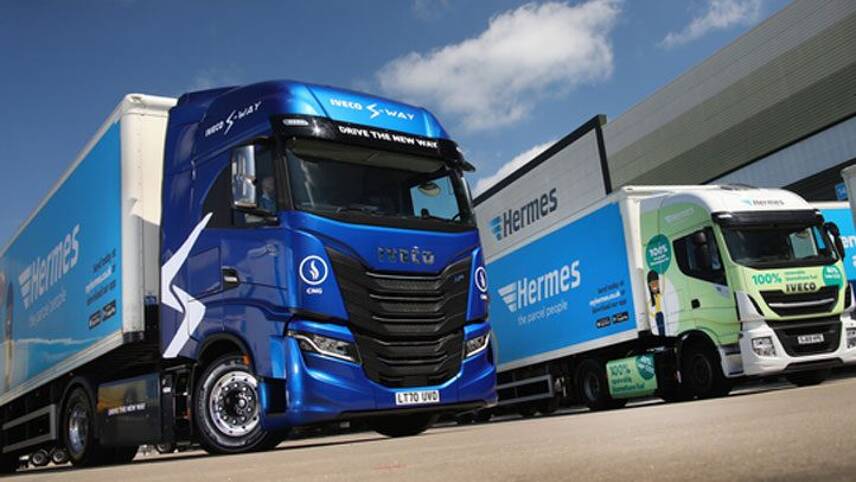Register for free and continue reading
Join our growing army of changemakers and get unlimited access to our premium content

Image: Hermes
The firm has confirmed that it has signed a deal with Italian multinational auto manufacturer IVECO for 70 S-WAY trucks.
In a statement, Hermes claimed that S-WAY trucks produce 80% less CO2 emissions compared to diesel trucks which comply with Euro VI standards – the standards most commonly used for low-emission zone requirements. Other reported benefits include an 88% reduction in tailpipe methane emissions and a 70% reduction in nitrous oxide (NOX), a common air pollutant.
Hermes already operates 90 CNG trucks, so the order from IVECO will bring the total to 160 – around half of its fleet of vehicles of this size. The firm estimates that, collectively, these 160 vehicles will reduce its annual CO2 footprint by some 24,000 tonnes.
The only UK business with more than 160 CNG trucks in its fleet at present is retailer John Lewis Partnership, which is aiming to phase out all 600 of its diesel-powered trucks by 2028. As such, Hermes has claimed it will host the UK’s largest network of CNG-powered vehicles in the parcel sector once the new trucks are delivered.
Hermes has additionally confirmed plans to trial the IVECO Eurocargo, a 12-tonne van that runs on CNG, across routes in central London. The firm’s central London routes are already served by an electric fleet, but it said in a statement that many retail clients in the capital are also seeking an alternative fuel option. Details of the trial’s length and scope have not yet been revealed.
edie has reached out to Hermes for further information about whether the CNG used to power the vehicles is fossil-derived or renewable. The most common kind of renewable natural gas is biomethane, often derived from waste from landfills and livestock via anaerobic digestion. Prior to the new announcement, Hermes had confirmed plans to use Scotland’s first biomethane refuelling station when it opens later this year.
Hermes’ head of fleet David Landy said: “Sustainability is a huge focus for us as we recognise our responsibility as one of the UK’s largest consumer delivery companies. We are committed to putting sustainability at the heart of every aspect of our business, through innovative products and processes.
“As such, we were an early adopter of CNG as an alternative fuel and are continuing to increase its presence in our fleet, to drive down emissions.”
Hermes’ parent company is Otto Group. Last year, Otto Group announced an ambition to become a carbon-neutral business by 2030, after delivering an ambition to halve Group-wide emissions between 2006 and 2020.
Otto Group has repeatedly stated that it will “pursue CO2 avoidance and reduction” before turning to carbon offsetting. It has not yet applied to the Science-Based Targets Initiative (SBTi) with new reduction goals.
Keep on (low-carbon) trucking
The announcement from Hermes comes after the UK Government unveiled its Transport Decarbonisation Plan last month. This policy package is designed to support businesses and other actors across the value chains for all modes of transport to achieve net-zero by the legally binding 2050 deadline.
Included in the Plan is a commitment for the sale of new diesel and petrol heavy goods vehicles (HGVs) to be banned in the UK by 2040. The Department for Transport (DfT) will consult on proposals to phase out polluting vehicles weighing between 3.5 tonnes and 26 tonnes from 2035 and those weighing more than 26 tonnes from 2040. It has stated that earlier dates will be set if the private sector agrees that a faster transition is “feasible”.
Sarah George


Please login or Register to leave a comment.